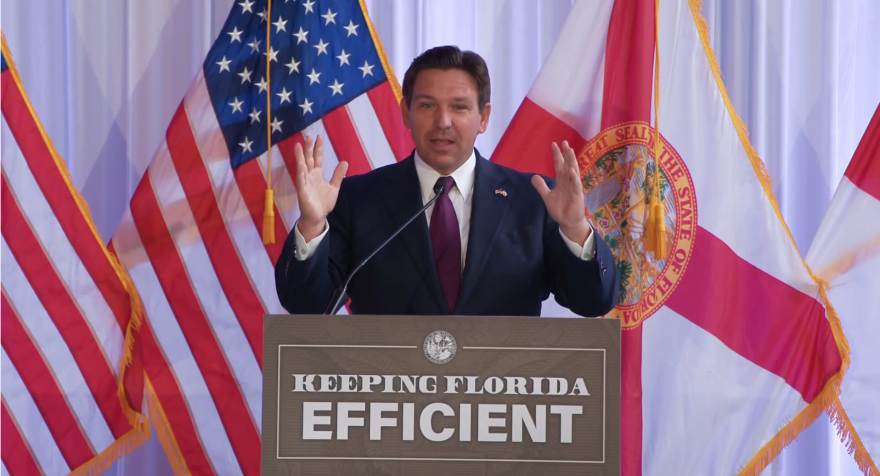As deportation flights begin taking off from the Everglades detention center known as Alligator Alcatraz, concerns about the facility are ramping up in Central Florida.
Democratic state lawmakers invited community members to a Friday briefing on some of the latest developments with the detention facility, as well as the federal government’s ongoing mission to identify and reduce what it characterizes as wasteful spending.
DeSantis has embraced and is working to emulate the federal Department of Government Efficiency, or DOGE, originally headed up by billionaire Elon Musk. The Florida governor launched a similar task force for the state earlier this year, announcing it would weed out diversity, equity and inclusion or DEI initiatives at public universities.
“You can't simply say you're following our law to eliminate DEI by just simply re-characterizing it using different terms, you're still violating the law. And if we find that, we will absolutely hold you accountable,” DeSantis said in February.

As he works to cut state spending, DeSantis is also eyeing the possibility of reducing or eliminating some property taxes in Florida. Back in March, DeSantis said he’d support a potential 2026 ballot initiative asking voters to decide whether they want to completely eliminate property taxes in the state.
It’s a possibility that concerns some Central Florida leaders, including Democratic State Rep. Anna Eskamani, who joined Democratic State Sen. Carlos Guillermo Smith at the Pine Castle Woman’s Club in Orange County Friday to meet with about two dozen Central Floridians.
RELATED: Removing property taxes in Florida? New report calls that "a risky proposition"
Recognizing that housing affordability is undoubtedly a problem in the state, Eskamani said she’s open to exploring ways to make tax systems less regressive. But critical public services Floridians depend on would crumble if property taxes were to be eliminated entirely, she said.
“[It] sounds nice on paper. But operationally, right? Operationally, that will defund public schools, that will defund police, it will defund fire,” Eskamani said.
As state and federal agencies work aggressively to reduce spending, Eskamani said, the governor’s interest in reducing or eliminating property taxes is likely part of that puzzle.
“I see a connection. I think these issues are interconnected,” Eskamani said. “They're gonna attack local governments; brand local governments as ‘bad,’ to then pull away revenue from them, which is going to lead to consolidation. That means that cities and counties will disappear, giving more power to state government.
“I don't know about y'all, but I feel like the best government is your local government. They have the most access to you, the most accountability,” Eskamani said Friday, to sounds of approval from residents in the room.

When it comes to the so-called Alligator Alcatraz detention facility in Collier County, which both state lawmakers recently visited, Guillermo Smith and Eskamani said they have many concerns about the facility’s poor conditions and a lack of due process for detainees.
“What is driving the enforcement of this immigration regime is racism,” Guillermo Smith said Friday, to a chorus of support from attendees.

“There are no white immigrants being detained in these facilities. We visually confirmed that, and the data backs that up as well,” Guillermo Smith said, referring to detainees he’s seen at the Everglades detention facility and the Orange County Jail, where some people detained by Immigration and Customs Enforcement are being housed.
RELATED: Orange County to renegotiate deal with ICE and its jail
While he vehemently opposes what’s happening in the U.S. immigration system right now, Guillermo Smith said, coming up with real solutions to the system’s problems will require more than simple opposition.
“We actually need comprehensive immigration reform,” Guillermo Smith. “We need these individuals to be able to have clear, concise work programs, work visa programs, so that they can continue to stay here in the United States and work. Because we need them to.
“We have dramatic labor shortages in so many industries, whether they be construction, whether they be healthcare,” Guillermo Smith said. “There's just so many industries where immigrants have been and are a part of the solution.”

Orlando resident Anita Guerra, a mom and public school teacher, was among those at Friday’s community meeting. She said she wants more people to understand how elected leaders are benefiting, financially, from detaining people at Alligator Alcatraz.
“People are making money off of this, and I don't think the average person knows,” Guerra said.
Since Florida officials first announced plans for the Everglades detention center, the Executive Office of the Governor awarded contracts totaling more than $245 million in taxpayer funds to build and manage the facility, according to the Associated Press, citing a state database of government contracts.
A public database kept by the state previously contained more details about those state-awarded contracts — but recently, those contracts were removed and replaced by one-page coversheets containing much less information. A spokeswoman for the Florida Division of Emergency Management said the contracts were removed because they included “proprietary information that shouldn’t have been uploaded.”
Eskamani said Friday she is working with the Florida Center for Government Accountability on a public records lawsuit to regain access to the details of those state contracts.
Meanwhile, Guerra said she plans to try and stay as informed and involved as she can. She said she wants to volunteer to register voters, help immigrants — and follow the money.
“I'm just concerned for our citizens here in Central Florida and really, across the country, because people are disappearing, and we have no idea where they're at,” Guerra said. “It should be concerning to everybody, because at some point it's going to affect everyone.”






